University Leadership Module: Self-Reflection Report and Analysis
VerifiedAdded on 2022/09/12
|8
|2588
|21
Report
AI Summary
This report is a self-reflection on a leadership module, detailing the student's learning journey through classroom interactions, group discussions, and case studies. It utilizes Kolb's learning cycle to analyze experiences, feelings, thoughts, and reflections related to leadership concepts such as transformational and distributed leadership. The student explores the complexities of leadership, including gender diversity, ethical implications, and the differences between managers and leaders. The report highlights the importance of self-reflection and application of leadership theories in professional life, including personal strengths, weaknesses, and plans for future development. The student gained insights on leadership theories, the role of followership, and the need for continuous self-evaluation to become an effective leader. The learning journal and review provide a comprehensive analysis of the student's leadership approach and future development goals.
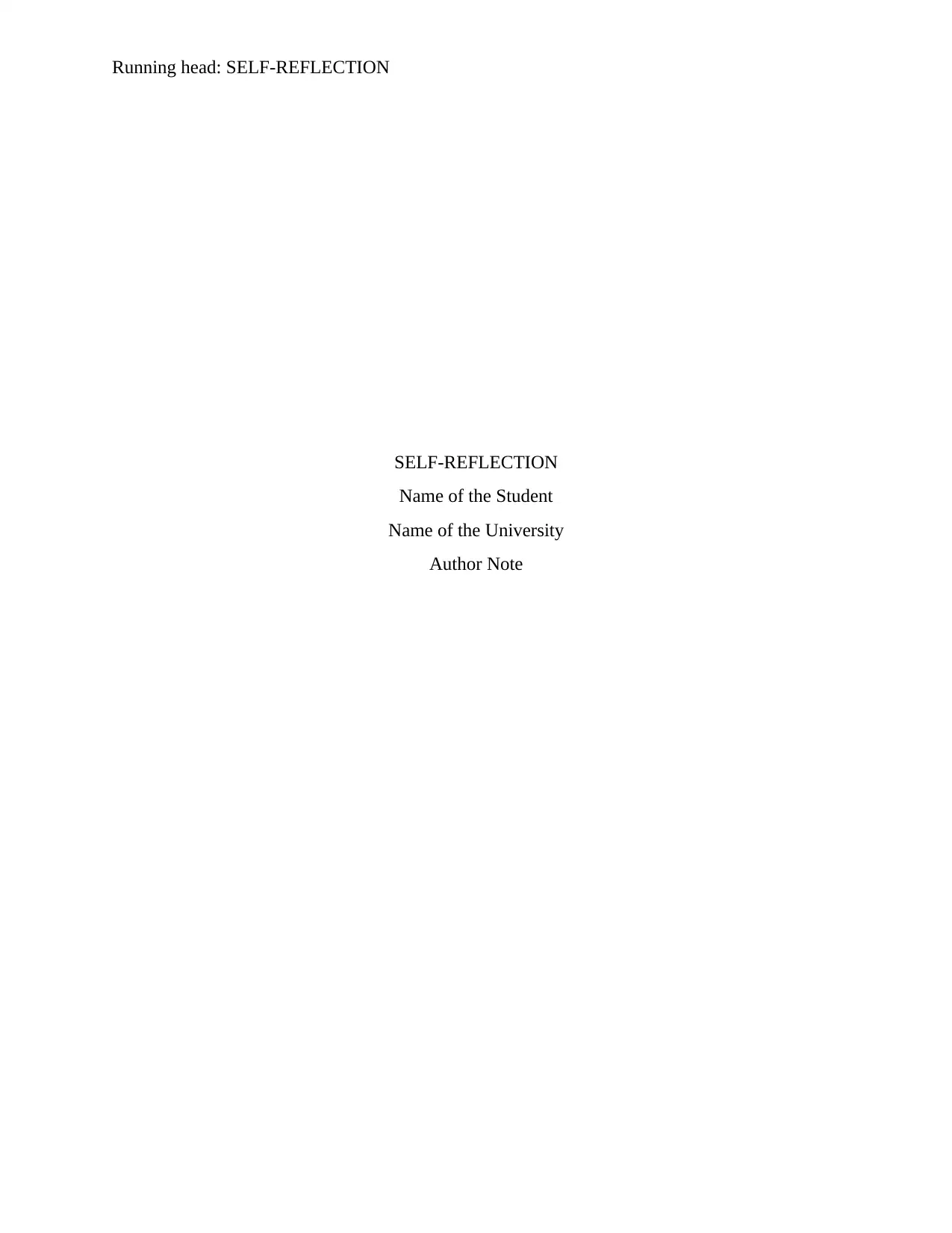
Running head: SELF-REFLECTION
SELF-REFLECTION
Name of the Student
Name of the University
Author Note
SELF-REFLECTION
Name of the Student
Name of the University
Author Note
Paraphrase This Document
Need a fresh take? Get an instant paraphrase of this document with our AI Paraphraser
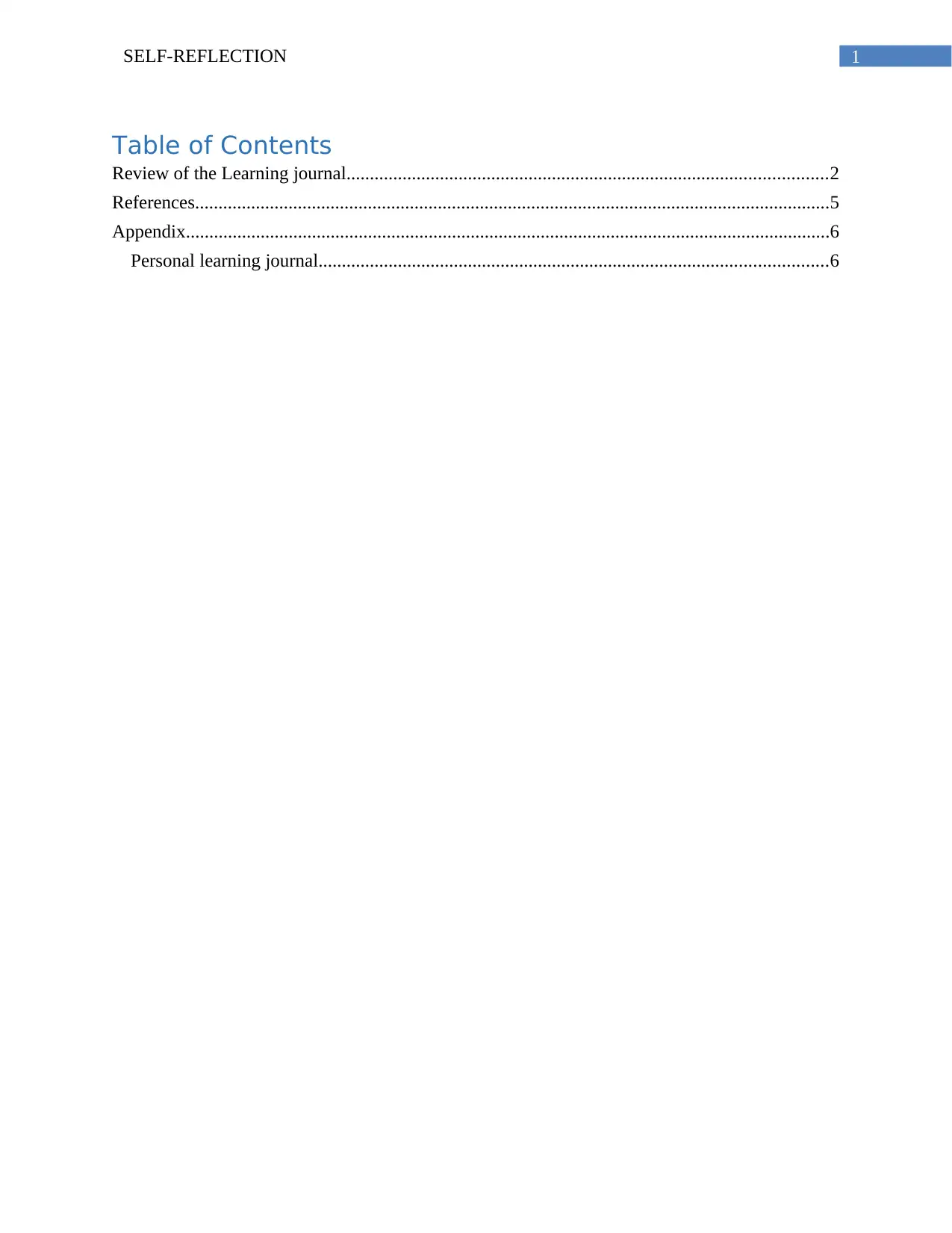
1SELF-REFLECTION
Table of Contents
Review of the Learning journal.......................................................................................................2
References........................................................................................................................................5
Appendix..........................................................................................................................................6
Personal learning journal.............................................................................................................6
Table of Contents
Review of the Learning journal.......................................................................................................2
References........................................................................................................................................5
Appendix..........................................................................................................................................6
Personal learning journal.............................................................................................................6
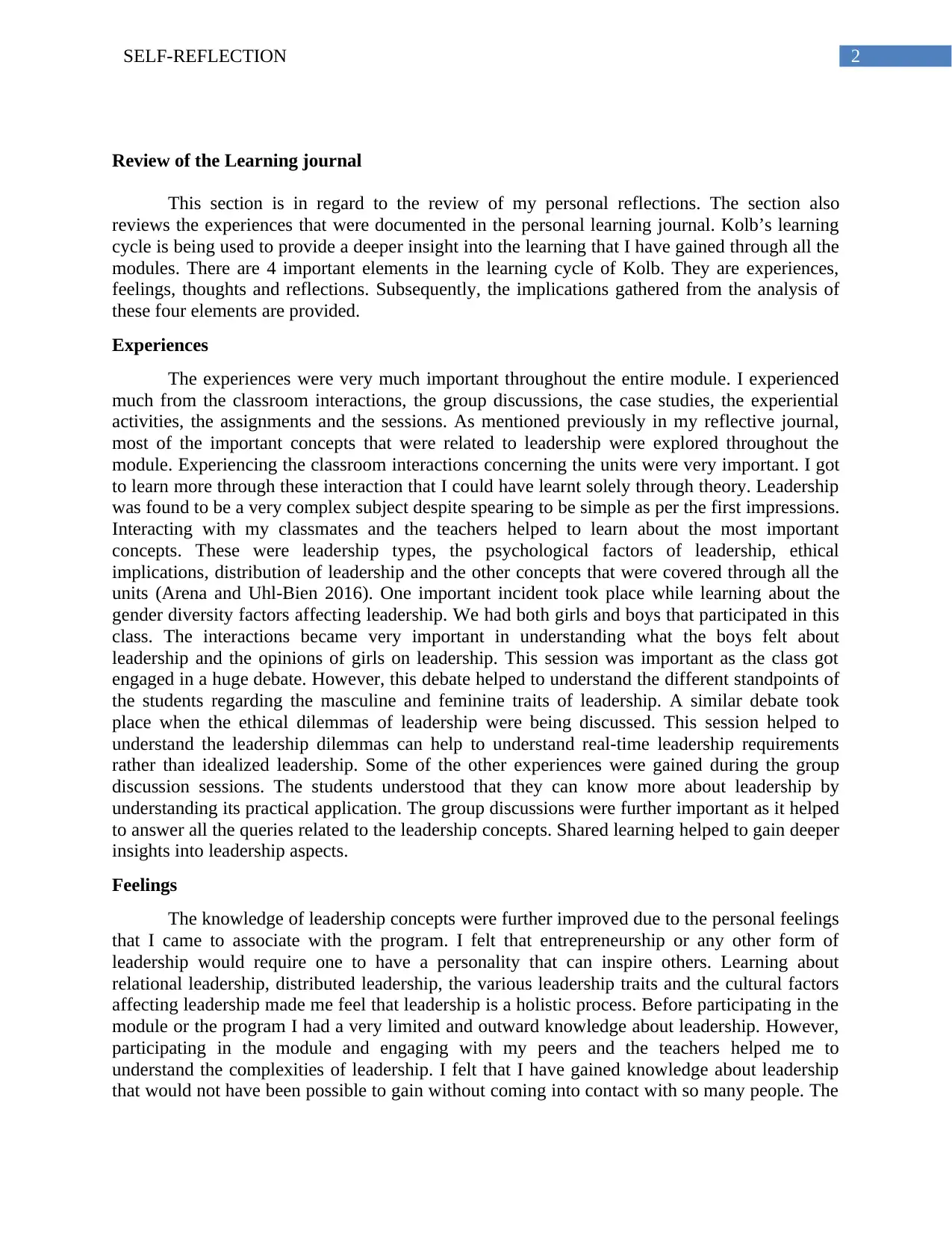
2SELF-REFLECTION
Review of the Learning journal
This section is in regard to the review of my personal reflections. The section also
reviews the experiences that were documented in the personal learning journal. Kolb’s learning
cycle is being used to provide a deeper insight into the learning that I have gained through all the
modules. There are 4 important elements in the learning cycle of Kolb. They are experiences,
feelings, thoughts and reflections. Subsequently, the implications gathered from the analysis of
these four elements are provided.
Experiences
The experiences were very much important throughout the entire module. I experienced
much from the classroom interactions, the group discussions, the case studies, the experiential
activities, the assignments and the sessions. As mentioned previously in my reflective journal,
most of the important concepts that were related to leadership were explored throughout the
module. Experiencing the classroom interactions concerning the units were very important. I got
to learn more through these interaction that I could have learnt solely through theory. Leadership
was found to be a very complex subject despite spearing to be simple as per the first impressions.
Interacting with my classmates and the teachers helped to learn about the most important
concepts. These were leadership types, the psychological factors of leadership, ethical
implications, distribution of leadership and the other concepts that were covered through all the
units (Arena and Uhl-Bien 2016). One important incident took place while learning about the
gender diversity factors affecting leadership. We had both girls and boys that participated in this
class. The interactions became very important in understanding what the boys felt about
leadership and the opinions of girls on leadership. This session was important as the class got
engaged in a huge debate. However, this debate helped to understand the different standpoints of
the students regarding the masculine and feminine traits of leadership. A similar debate took
place when the ethical dilemmas of leadership were being discussed. This session helped to
understand the leadership dilemmas can help to understand real-time leadership requirements
rather than idealized leadership. Some of the other experiences were gained during the group
discussion sessions. The students understood that they can know more about leadership by
understanding its practical application. The group discussions were further important as it helped
to answer all the queries related to the leadership concepts. Shared learning helped to gain deeper
insights into leadership aspects.
Feelings
The knowledge of leadership concepts were further improved due to the personal feelings
that I came to associate with the program. I felt that entrepreneurship or any other form of
leadership would require one to have a personality that can inspire others. Learning about
relational leadership, distributed leadership, the various leadership traits and the cultural factors
affecting leadership made me feel that leadership is a holistic process. Before participating in the
module or the program I had a very limited and outward knowledge about leadership. However,
participating in the module and engaging with my peers and the teachers helped me to
understand the complexities of leadership. I felt that I have gained knowledge about leadership
that would not have been possible to gain without coming into contact with so many people. The
Review of the Learning journal
This section is in regard to the review of my personal reflections. The section also
reviews the experiences that were documented in the personal learning journal. Kolb’s learning
cycle is being used to provide a deeper insight into the learning that I have gained through all the
modules. There are 4 important elements in the learning cycle of Kolb. They are experiences,
feelings, thoughts and reflections. Subsequently, the implications gathered from the analysis of
these four elements are provided.
Experiences
The experiences were very much important throughout the entire module. I experienced
much from the classroom interactions, the group discussions, the case studies, the experiential
activities, the assignments and the sessions. As mentioned previously in my reflective journal,
most of the important concepts that were related to leadership were explored throughout the
module. Experiencing the classroom interactions concerning the units were very important. I got
to learn more through these interaction that I could have learnt solely through theory. Leadership
was found to be a very complex subject despite spearing to be simple as per the first impressions.
Interacting with my classmates and the teachers helped to learn about the most important
concepts. These were leadership types, the psychological factors of leadership, ethical
implications, distribution of leadership and the other concepts that were covered through all the
units (Arena and Uhl-Bien 2016). One important incident took place while learning about the
gender diversity factors affecting leadership. We had both girls and boys that participated in this
class. The interactions became very important in understanding what the boys felt about
leadership and the opinions of girls on leadership. This session was important as the class got
engaged in a huge debate. However, this debate helped to understand the different standpoints of
the students regarding the masculine and feminine traits of leadership. A similar debate took
place when the ethical dilemmas of leadership were being discussed. This session helped to
understand the leadership dilemmas can help to understand real-time leadership requirements
rather than idealized leadership. Some of the other experiences were gained during the group
discussion sessions. The students understood that they can know more about leadership by
understanding its practical application. The group discussions were further important as it helped
to answer all the queries related to the leadership concepts. Shared learning helped to gain deeper
insights into leadership aspects.
Feelings
The knowledge of leadership concepts were further improved due to the personal feelings
that I came to associate with the program. I felt that entrepreneurship or any other form of
leadership would require one to have a personality that can inspire others. Learning about
relational leadership, distributed leadership, the various leadership traits and the cultural factors
affecting leadership made me feel that leadership is a holistic process. Before participating in the
module or the program I had a very limited and outward knowledge about leadership. However,
participating in the module and engaging with my peers and the teachers helped me to
understand the complexities of leadership. I felt that I have gained knowledge about leadership
that would not have been possible to gain without coming into contact with so many people. The
⊘ This is a preview!⊘
Do you want full access?
Subscribe today to unlock all pages.

Trusted by 1+ million students worldwide
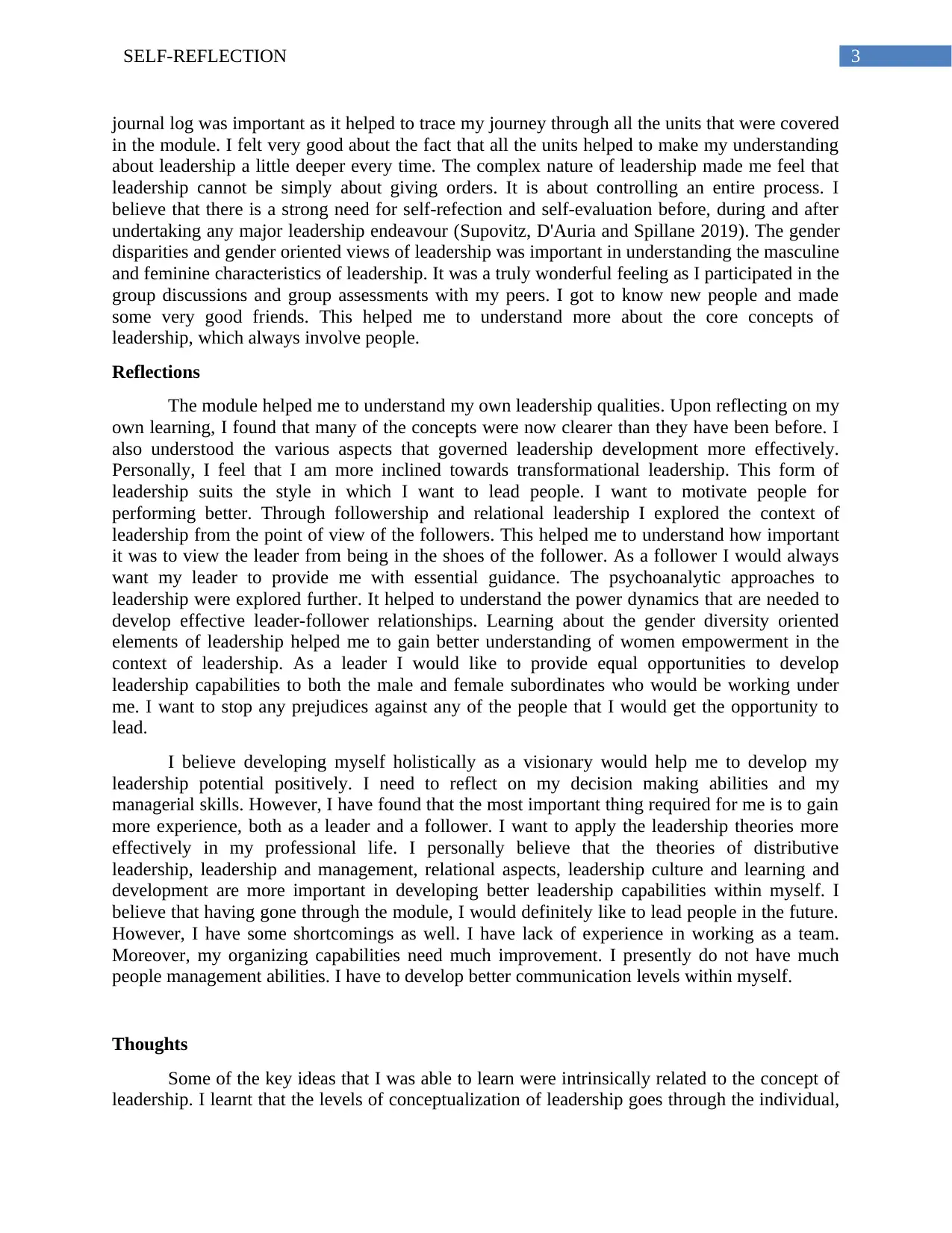
3SELF-REFLECTION
journal log was important as it helped to trace my journey through all the units that were covered
in the module. I felt very good about the fact that all the units helped to make my understanding
about leadership a little deeper every time. The complex nature of leadership made me feel that
leadership cannot be simply about giving orders. It is about controlling an entire process. I
believe that there is a strong need for self-refection and self-evaluation before, during and after
undertaking any major leadership endeavour (Supovitz, D'Auria and Spillane 2019). The gender
disparities and gender oriented views of leadership was important in understanding the masculine
and feminine characteristics of leadership. It was a truly wonderful feeling as I participated in the
group discussions and group assessments with my peers. I got to know new people and made
some very good friends. This helped me to understand more about the core concepts of
leadership, which always involve people.
Reflections
The module helped me to understand my own leadership qualities. Upon reflecting on my
own learning, I found that many of the concepts were now clearer than they have been before. I
also understood the various aspects that governed leadership development more effectively.
Personally, I feel that I am more inclined towards transformational leadership. This form of
leadership suits the style in which I want to lead people. I want to motivate people for
performing better. Through followership and relational leadership I explored the context of
leadership from the point of view of the followers. This helped me to understand how important
it was to view the leader from being in the shoes of the follower. As a follower I would always
want my leader to provide me with essential guidance. The psychoanalytic approaches to
leadership were explored further. It helped to understand the power dynamics that are needed to
develop effective leader-follower relationships. Learning about the gender diversity oriented
elements of leadership helped me to gain better understanding of women empowerment in the
context of leadership. As a leader I would like to provide equal opportunities to develop
leadership capabilities to both the male and female subordinates who would be working under
me. I want to stop any prejudices against any of the people that I would get the opportunity to
lead.
I believe developing myself holistically as a visionary would help me to develop my
leadership potential positively. I need to reflect on my decision making abilities and my
managerial skills. However, I have found that the most important thing required for me is to gain
more experience, both as a leader and a follower. I want to apply the leadership theories more
effectively in my professional life. I personally believe that the theories of distributive
leadership, leadership and management, relational aspects, leadership culture and learning and
development are more important in developing better leadership capabilities within myself. I
believe that having gone through the module, I would definitely like to lead people in the future.
However, I have some shortcomings as well. I have lack of experience in working as a team.
Moreover, my organizing capabilities need much improvement. I presently do not have much
people management abilities. I have to develop better communication levels within myself.
Thoughts
Some of the key ideas that I was able to learn were intrinsically related to the concept of
leadership. I learnt that the levels of conceptualization of leadership goes through the individual,
journal log was important as it helped to trace my journey through all the units that were covered
in the module. I felt very good about the fact that all the units helped to make my understanding
about leadership a little deeper every time. The complex nature of leadership made me feel that
leadership cannot be simply about giving orders. It is about controlling an entire process. I
believe that there is a strong need for self-refection and self-evaluation before, during and after
undertaking any major leadership endeavour (Supovitz, D'Auria and Spillane 2019). The gender
disparities and gender oriented views of leadership was important in understanding the masculine
and feminine characteristics of leadership. It was a truly wonderful feeling as I participated in the
group discussions and group assessments with my peers. I got to know new people and made
some very good friends. This helped me to understand more about the core concepts of
leadership, which always involve people.
Reflections
The module helped me to understand my own leadership qualities. Upon reflecting on my
own learning, I found that many of the concepts were now clearer than they have been before. I
also understood the various aspects that governed leadership development more effectively.
Personally, I feel that I am more inclined towards transformational leadership. This form of
leadership suits the style in which I want to lead people. I want to motivate people for
performing better. Through followership and relational leadership I explored the context of
leadership from the point of view of the followers. This helped me to understand how important
it was to view the leader from being in the shoes of the follower. As a follower I would always
want my leader to provide me with essential guidance. The psychoanalytic approaches to
leadership were explored further. It helped to understand the power dynamics that are needed to
develop effective leader-follower relationships. Learning about the gender diversity oriented
elements of leadership helped me to gain better understanding of women empowerment in the
context of leadership. As a leader I would like to provide equal opportunities to develop
leadership capabilities to both the male and female subordinates who would be working under
me. I want to stop any prejudices against any of the people that I would get the opportunity to
lead.
I believe developing myself holistically as a visionary would help me to develop my
leadership potential positively. I need to reflect on my decision making abilities and my
managerial skills. However, I have found that the most important thing required for me is to gain
more experience, both as a leader and a follower. I want to apply the leadership theories more
effectively in my professional life. I personally believe that the theories of distributive
leadership, leadership and management, relational aspects, leadership culture and learning and
development are more important in developing better leadership capabilities within myself. I
believe that having gone through the module, I would definitely like to lead people in the future.
However, I have some shortcomings as well. I have lack of experience in working as a team.
Moreover, my organizing capabilities need much improvement. I presently do not have much
people management abilities. I have to develop better communication levels within myself.
Thoughts
Some of the key ideas that I was able to learn were intrinsically related to the concept of
leadership. I learnt that the levels of conceptualization of leadership goes through the individual,
Paraphrase This Document
Need a fresh take? Get an instant paraphrase of this document with our AI Paraphraser
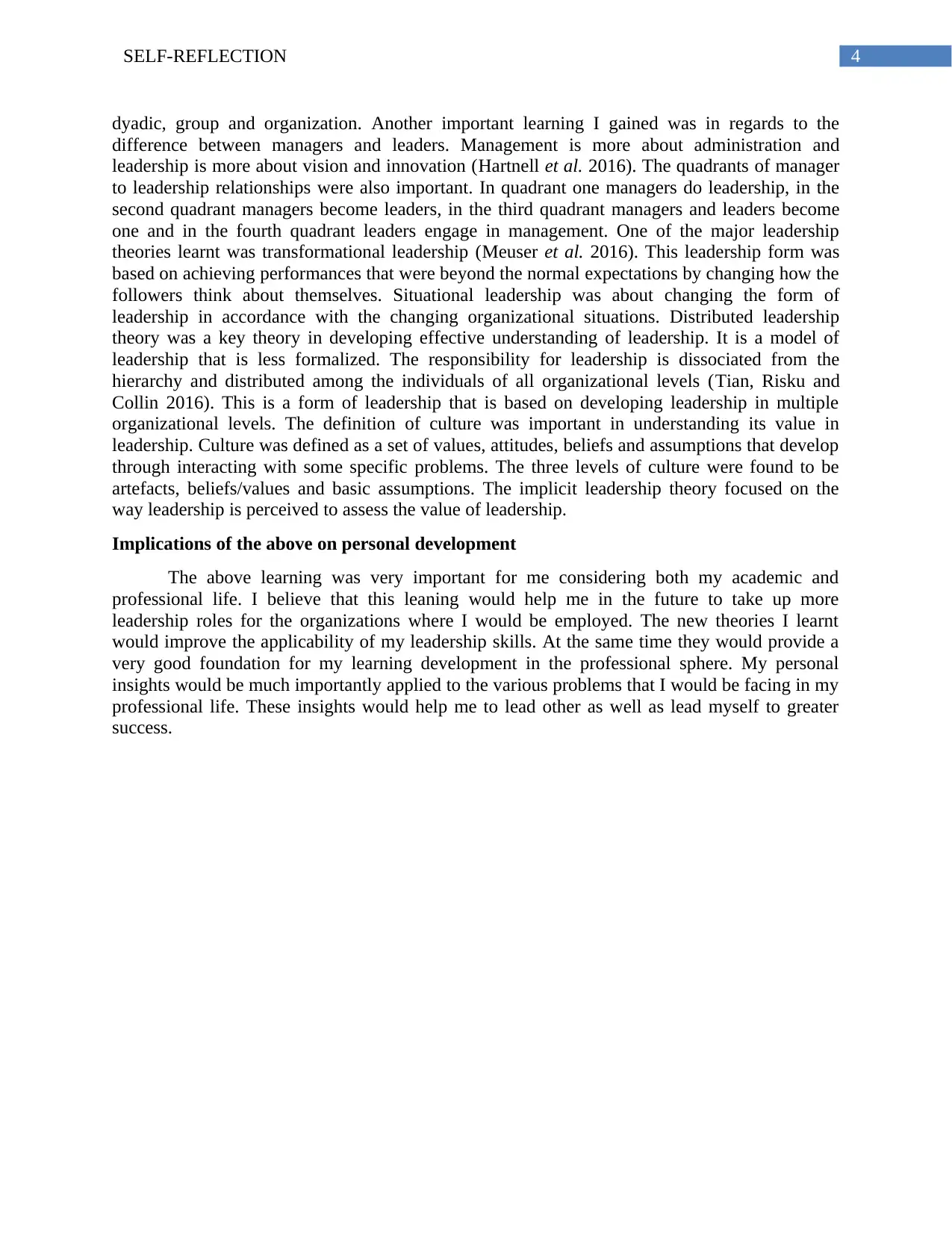
4SELF-REFLECTION
dyadic, group and organization. Another important learning I gained was in regards to the
difference between managers and leaders. Management is more about administration and
leadership is more about vision and innovation (Hartnell et al. 2016). The quadrants of manager
to leadership relationships were also important. In quadrant one managers do leadership, in the
second quadrant managers become leaders, in the third quadrant managers and leaders become
one and in the fourth quadrant leaders engage in management. One of the major leadership
theories learnt was transformational leadership (Meuser et al. 2016). This leadership form was
based on achieving performances that were beyond the normal expectations by changing how the
followers think about themselves. Situational leadership was about changing the form of
leadership in accordance with the changing organizational situations. Distributed leadership
theory was a key theory in developing effective understanding of leadership. It is a model of
leadership that is less formalized. The responsibility for leadership is dissociated from the
hierarchy and distributed among the individuals of all organizational levels (Tian, Risku and
Collin 2016). This is a form of leadership that is based on developing leadership in multiple
organizational levels. The definition of culture was important in understanding its value in
leadership. Culture was defined as a set of values, attitudes, beliefs and assumptions that develop
through interacting with some specific problems. The three levels of culture were found to be
artefacts, beliefs/values and basic assumptions. The implicit leadership theory focused on the
way leadership is perceived to assess the value of leadership.
Implications of the above on personal development
The above learning was very important for me considering both my academic and
professional life. I believe that this leaning would help me in the future to take up more
leadership roles for the organizations where I would be employed. The new theories I learnt
would improve the applicability of my leadership skills. At the same time they would provide a
very good foundation for my learning development in the professional sphere. My personal
insights would be much importantly applied to the various problems that I would be facing in my
professional life. These insights would help me to lead other as well as lead myself to greater
success.
dyadic, group and organization. Another important learning I gained was in regards to the
difference between managers and leaders. Management is more about administration and
leadership is more about vision and innovation (Hartnell et al. 2016). The quadrants of manager
to leadership relationships were also important. In quadrant one managers do leadership, in the
second quadrant managers become leaders, in the third quadrant managers and leaders become
one and in the fourth quadrant leaders engage in management. One of the major leadership
theories learnt was transformational leadership (Meuser et al. 2016). This leadership form was
based on achieving performances that were beyond the normal expectations by changing how the
followers think about themselves. Situational leadership was about changing the form of
leadership in accordance with the changing organizational situations. Distributed leadership
theory was a key theory in developing effective understanding of leadership. It is a model of
leadership that is less formalized. The responsibility for leadership is dissociated from the
hierarchy and distributed among the individuals of all organizational levels (Tian, Risku and
Collin 2016). This is a form of leadership that is based on developing leadership in multiple
organizational levels. The definition of culture was important in understanding its value in
leadership. Culture was defined as a set of values, attitudes, beliefs and assumptions that develop
through interacting with some specific problems. The three levels of culture were found to be
artefacts, beliefs/values and basic assumptions. The implicit leadership theory focused on the
way leadership is perceived to assess the value of leadership.
Implications of the above on personal development
The above learning was very important for me considering both my academic and
professional life. I believe that this leaning would help me in the future to take up more
leadership roles for the organizations where I would be employed. The new theories I learnt
would improve the applicability of my leadership skills. At the same time they would provide a
very good foundation for my learning development in the professional sphere. My personal
insights would be much importantly applied to the various problems that I would be facing in my
professional life. These insights would help me to lead other as well as lead myself to greater
success.
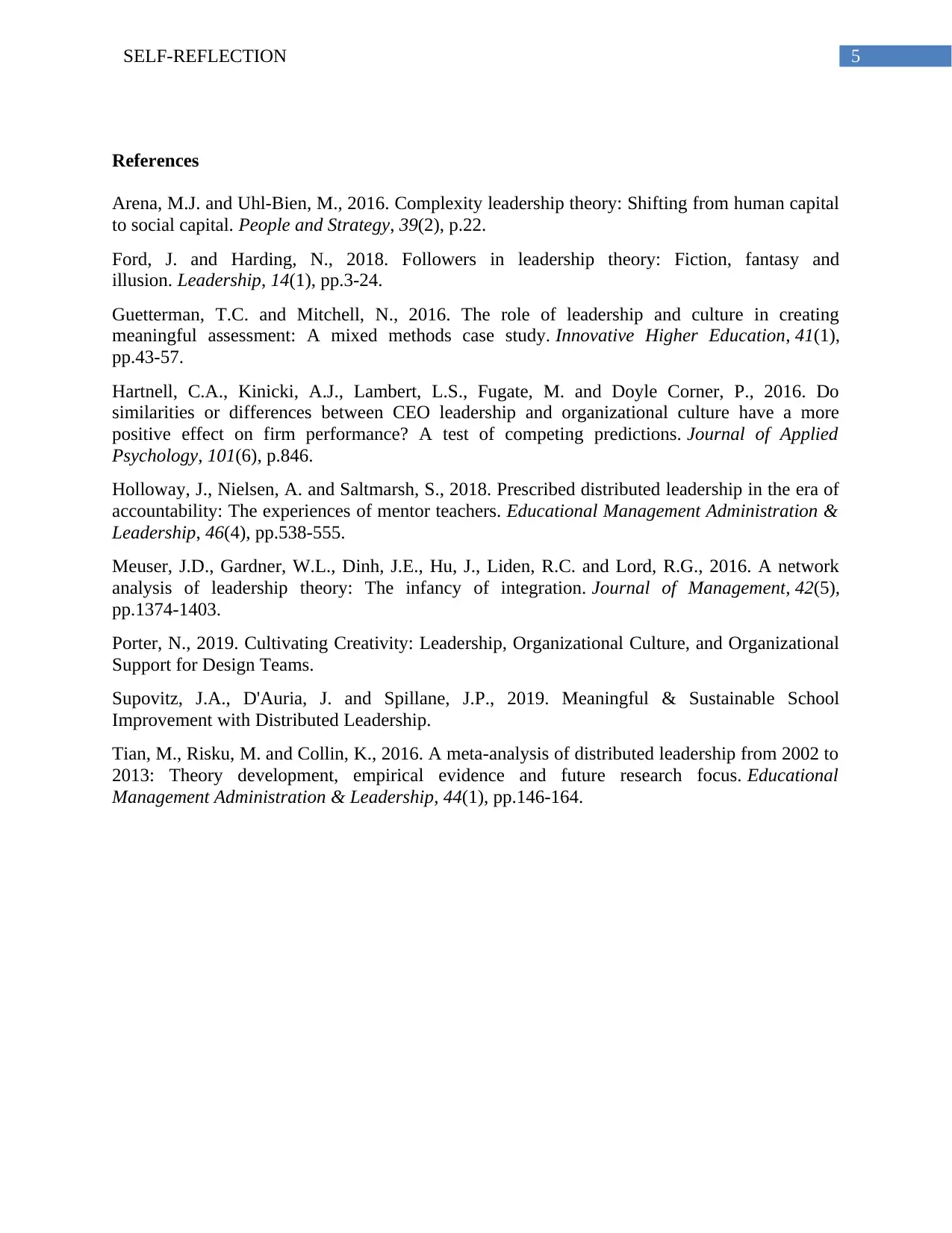
5SELF-REFLECTION
References
Arena, M.J. and Uhl-Bien, M., 2016. Complexity leadership theory: Shifting from human capital
to social capital. People and Strategy, 39(2), p.22.
Ford, J. and Harding, N., 2018. Followers in leadership theory: Fiction, fantasy and
illusion. Leadership, 14(1), pp.3-24.
Guetterman, T.C. and Mitchell, N., 2016. The role of leadership and culture in creating
meaningful assessment: A mixed methods case study. Innovative Higher Education, 41(1),
pp.43-57.
Hartnell, C.A., Kinicki, A.J., Lambert, L.S., Fugate, M. and Doyle Corner, P., 2016. Do
similarities or differences between CEO leadership and organizational culture have a more
positive effect on firm performance? A test of competing predictions. Journal of Applied
Psychology, 101(6), p.846.
Holloway, J., Nielsen, A. and Saltmarsh, S., 2018. Prescribed distributed leadership in the era of
accountability: The experiences of mentor teachers. Educational Management Administration &
Leadership, 46(4), pp.538-555.
Meuser, J.D., Gardner, W.L., Dinh, J.E., Hu, J., Liden, R.C. and Lord, R.G., 2016. A network
analysis of leadership theory: The infancy of integration. Journal of Management, 42(5),
pp.1374-1403.
Porter, N., 2019. Cultivating Creativity: Leadership, Organizational Culture, and Organizational
Support for Design Teams.
Supovitz, J.A., D'Auria, J. and Spillane, J.P., 2019. Meaningful & Sustainable School
Improvement with Distributed Leadership.
Tian, M., Risku, M. and Collin, K., 2016. A meta-analysis of distributed leadership from 2002 to
2013: Theory development, empirical evidence and future research focus. Educational
Management Administration & Leadership, 44(1), pp.146-164.
References
Arena, M.J. and Uhl-Bien, M., 2016. Complexity leadership theory: Shifting from human capital
to social capital. People and Strategy, 39(2), p.22.
Ford, J. and Harding, N., 2018. Followers in leadership theory: Fiction, fantasy and
illusion. Leadership, 14(1), pp.3-24.
Guetterman, T.C. and Mitchell, N., 2016. The role of leadership and culture in creating
meaningful assessment: A mixed methods case study. Innovative Higher Education, 41(1),
pp.43-57.
Hartnell, C.A., Kinicki, A.J., Lambert, L.S., Fugate, M. and Doyle Corner, P., 2016. Do
similarities or differences between CEO leadership and organizational culture have a more
positive effect on firm performance? A test of competing predictions. Journal of Applied
Psychology, 101(6), p.846.
Holloway, J., Nielsen, A. and Saltmarsh, S., 2018. Prescribed distributed leadership in the era of
accountability: The experiences of mentor teachers. Educational Management Administration &
Leadership, 46(4), pp.538-555.
Meuser, J.D., Gardner, W.L., Dinh, J.E., Hu, J., Liden, R.C. and Lord, R.G., 2016. A network
analysis of leadership theory: The infancy of integration. Journal of Management, 42(5),
pp.1374-1403.
Porter, N., 2019. Cultivating Creativity: Leadership, Organizational Culture, and Organizational
Support for Design Teams.
Supovitz, J.A., D'Auria, J. and Spillane, J.P., 2019. Meaningful & Sustainable School
Improvement with Distributed Leadership.
Tian, M., Risku, M. and Collin, K., 2016. A meta-analysis of distributed leadership from 2002 to
2013: Theory development, empirical evidence and future research focus. Educational
Management Administration & Leadership, 44(1), pp.146-164.
⊘ This is a preview!⊘
Do you want full access?
Subscribe today to unlock all pages.

Trusted by 1+ million students worldwide
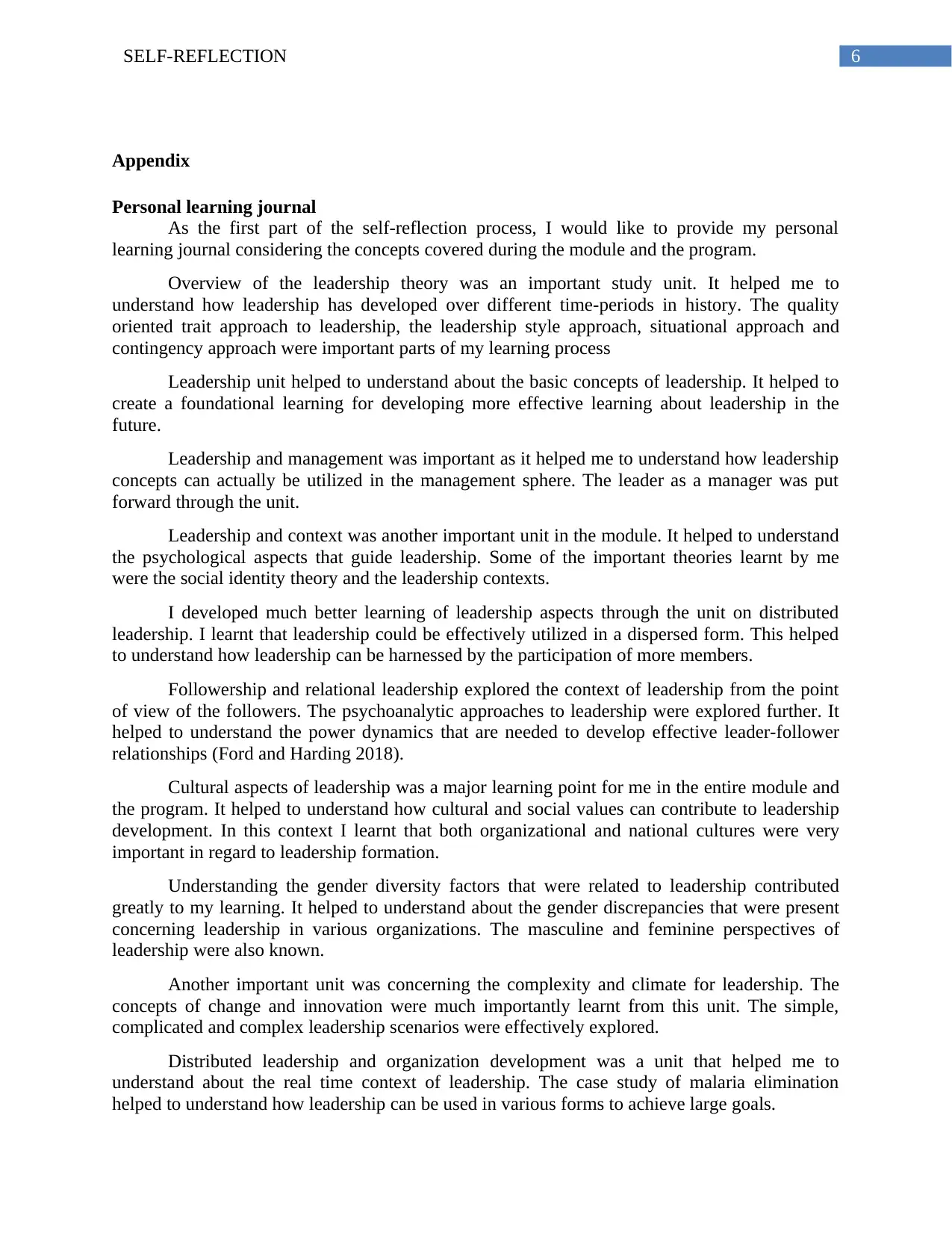
6SELF-REFLECTION
Appendix
Personal learning journal
As the first part of the self-reflection process, I would like to provide my personal
learning journal considering the concepts covered during the module and the program.
Overview of the leadership theory was an important study unit. It helped me to
understand how leadership has developed over different time-periods in history. The quality
oriented trait approach to leadership, the leadership style approach, situational approach and
contingency approach were important parts of my learning process
Leadership unit helped to understand about the basic concepts of leadership. It helped to
create a foundational learning for developing more effective learning about leadership in the
future.
Leadership and management was important as it helped me to understand how leadership
concepts can actually be utilized in the management sphere. The leader as a manager was put
forward through the unit.
Leadership and context was another important unit in the module. It helped to understand
the psychological aspects that guide leadership. Some of the important theories learnt by me
were the social identity theory and the leadership contexts.
I developed much better learning of leadership aspects through the unit on distributed
leadership. I learnt that leadership could be effectively utilized in a dispersed form. This helped
to understand how leadership can be harnessed by the participation of more members.
Followership and relational leadership explored the context of leadership from the point
of view of the followers. The psychoanalytic approaches to leadership were explored further. It
helped to understand the power dynamics that are needed to develop effective leader-follower
relationships (Ford and Harding 2018).
Cultural aspects of leadership was a major learning point for me in the entire module and
the program. It helped to understand how cultural and social values can contribute to leadership
development. In this context I learnt that both organizational and national cultures were very
important in regard to leadership formation.
Understanding the gender diversity factors that were related to leadership contributed
greatly to my learning. It helped to understand about the gender discrepancies that were present
concerning leadership in various organizations. The masculine and feminine perspectives of
leadership were also known.
Another important unit was concerning the complexity and climate for leadership. The
concepts of change and innovation were much importantly learnt from this unit. The simple,
complicated and complex leadership scenarios were effectively explored.
Distributed leadership and organization development was a unit that helped me to
understand about the real time context of leadership. The case study of malaria elimination
helped to understand how leadership can be used in various forms to achieve large goals.
Appendix
Personal learning journal
As the first part of the self-reflection process, I would like to provide my personal
learning journal considering the concepts covered during the module and the program.
Overview of the leadership theory was an important study unit. It helped me to
understand how leadership has developed over different time-periods in history. The quality
oriented trait approach to leadership, the leadership style approach, situational approach and
contingency approach were important parts of my learning process
Leadership unit helped to understand about the basic concepts of leadership. It helped to
create a foundational learning for developing more effective learning about leadership in the
future.
Leadership and management was important as it helped me to understand how leadership
concepts can actually be utilized in the management sphere. The leader as a manager was put
forward through the unit.
Leadership and context was another important unit in the module. It helped to understand
the psychological aspects that guide leadership. Some of the important theories learnt by me
were the social identity theory and the leadership contexts.
I developed much better learning of leadership aspects through the unit on distributed
leadership. I learnt that leadership could be effectively utilized in a dispersed form. This helped
to understand how leadership can be harnessed by the participation of more members.
Followership and relational leadership explored the context of leadership from the point
of view of the followers. The psychoanalytic approaches to leadership were explored further. It
helped to understand the power dynamics that are needed to develop effective leader-follower
relationships (Ford and Harding 2018).
Cultural aspects of leadership was a major learning point for me in the entire module and
the program. It helped to understand how cultural and social values can contribute to leadership
development. In this context I learnt that both organizational and national cultures were very
important in regard to leadership formation.
Understanding the gender diversity factors that were related to leadership contributed
greatly to my learning. It helped to understand about the gender discrepancies that were present
concerning leadership in various organizations. The masculine and feminine perspectives of
leadership were also known.
Another important unit was concerning the complexity and climate for leadership. The
concepts of change and innovation were much importantly learnt from this unit. The simple,
complicated and complex leadership scenarios were effectively explored.
Distributed leadership and organization development was a unit that helped me to
understand about the real time context of leadership. The case study of malaria elimination
helped to understand how leadership can be used in various forms to achieve large goals.
Paraphrase This Document
Need a fresh take? Get an instant paraphrase of this document with our AI Paraphraser
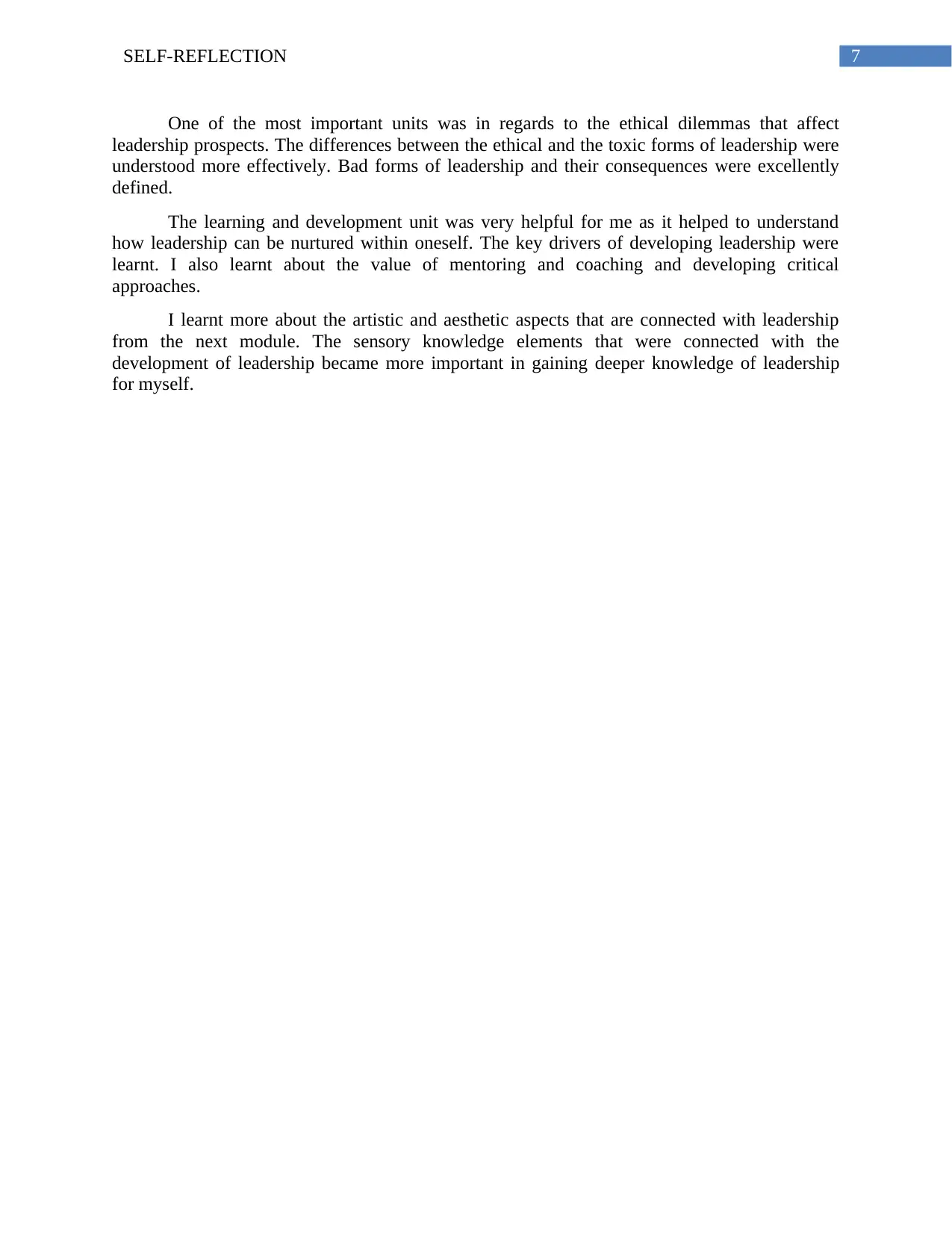
7SELF-REFLECTION
One of the most important units was in regards to the ethical dilemmas that affect
leadership prospects. The differences between the ethical and the toxic forms of leadership were
understood more effectively. Bad forms of leadership and their consequences were excellently
defined.
The learning and development unit was very helpful for me as it helped to understand
how leadership can be nurtured within oneself. The key drivers of developing leadership were
learnt. I also learnt about the value of mentoring and coaching and developing critical
approaches.
I learnt more about the artistic and aesthetic aspects that are connected with leadership
from the next module. The sensory knowledge elements that were connected with the
development of leadership became more important in gaining deeper knowledge of leadership
for myself.
One of the most important units was in regards to the ethical dilemmas that affect
leadership prospects. The differences between the ethical and the toxic forms of leadership were
understood more effectively. Bad forms of leadership and their consequences were excellently
defined.
The learning and development unit was very helpful for me as it helped to understand
how leadership can be nurtured within oneself. The key drivers of developing leadership were
learnt. I also learnt about the value of mentoring and coaching and developing critical
approaches.
I learnt more about the artistic and aesthetic aspects that are connected with leadership
from the next module. The sensory knowledge elements that were connected with the
development of leadership became more important in gaining deeper knowledge of leadership
for myself.
1 out of 8
Related Documents
Your All-in-One AI-Powered Toolkit for Academic Success.
+13062052269
info@desklib.com
Available 24*7 on WhatsApp / Email
![[object Object]](/_next/static/media/star-bottom.7253800d.svg)
Unlock your academic potential
Copyright © 2020–2026 A2Z Services. All Rights Reserved. Developed and managed by ZUCOL.





